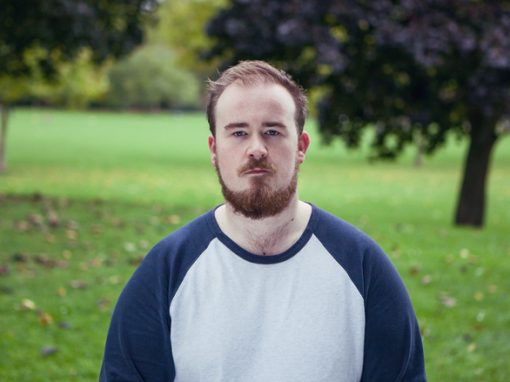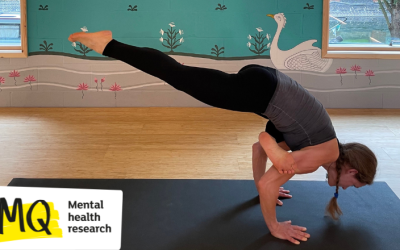This Mental Health Awareness Week 2024, the theme is Movement for Mental Health. In this article, MQ staff member Juliette Burton (pictured above) explains why her mental health lived experience has led to her movement – running to raise money for mental health...
Suicide
7,000
people in the UK take their own life each year
90%
of people who die by suicide have a mental health condition at the time of their death
For young men
Suicide is the leading cause of death
What is suicide?
Suicide is the act of ending your own life with intent.
Before suicide, a person may experience severe depression and/or suicidal feelings. Suicidal feelings are thoughts about ending your life or feeling that others would be better off without you. These suicidal feelings can lead to thoughts about ways to make plans around taking your own life.
It’s important to remember that though these feelings are temporary, and with the right help and support you can get through it.
What are the signs and symptoms?
By recognising signs and symptoms of suicidal thoughts, people will be able to help others and save one another. It is important to recognise these symptoms and direct the person to the right support. Everyone reacts differently to suicidal thoughts and experiences, but here are the signs that someone may have suicidal thoughts:
Feelings
- Hopelessness: the feeling that things will not get better or that there is no point of living.
- Uselessness: the feeling that you add no value to anything or to anyone.
- Pain: the feeling of suffering and agony and that you can’t imagine it ending.
- Sadness: feeling continuous low moods and tearful.
- Worthlessness: feeling that everyone would be better off without you.
- Curiosity: fascinated by death.
Behaviours
- Talking about death, dying or suicide: making jokes or subtle comments related to the theme.
- Giving away treasured possessions: those who intend to commit suicide may give away treasured possessions to ensure things are in order after they pass away.
- Making final arrangements: making or changing their will, saying their final goodbyes or making amends to someone who they have wronged.
- Changes in personality: abrupt and sudden changes in personality such as an extrovert becoming withdrawn or isolated. May self-loathe or have low self-esteem.
- Gaining access to lethal means: signs of buying a gun, stockpiling pills.
- Increased alcohol or drug use: people who are feeling suicidal may use alcohol or drugs as a means to escape what they are feeling.
If you feel that someone might have suicidal thoughts, there are a lot of things which might help, including:
- Give them a safe and open place to talk about their feelings by asking open questions, and give them time to talk about it, with no judgment.
- Encourage them to reach out for treatment and support.
- Offer practical or emotional support.
- Assist them in making a support plan or self-help.
- If someone has attempted suicide, call 999 and stay with them until the ambulance has arrived.
What are the causes of suicide?
There are many reasons as to why you may start to feel suicidal, typically, particular difficulties that you encounter in life. Here are some examples of common causes:
Physical or mental health problems
Long-term physical pain and illness or mental health conditions such as depression, bipolar disorder or schizophrenia may make a person more likely to have suicidal thoughts.
Past experiences
If you have experienced any form of bullying, discrimination, or any form of abuse such as domestic, sexual or physical abuse. Perhaps cultural pressure such as a forced marriage, or during pregnancy, childbirth or postnatal depression. All these events could lead to having suicidal thoughts.
Bereavement
Losing a loved one through death, or the end of a relationship may lead to feelings of overwhelming sadness and worthlessness.
Living problems
Struggles with housing such as being homeless, having financial problems, being in prison, or adjusting to big changes such as retirement may lead to thoughts of hopelessness and suicidal thoughts.
Medication
Research has shown that side effects of medication such as antidepressants, antipsychotic medication and mood stabilisers could increase the chances of suicidal feelings.
Particular groups are more prone to suicide
Men: In the UK and England, the highest suicide rate is among men aged 45-49.
Low or Middle-income countries: 77% of global suicides occur in low or middle-income countries.
LGBT: Research has shown that mental health problems are linked to homophobia, biphobia and transphobia, stigmas and discrimination as well as difficult experiences of coming out.
What are common treatments for Suicide?
Helplines and listening services
Helplines and listening services provide information and confidential support when you need it. This may help you with the overwhelming feelings you are facing and help you to recover.
Samaritans: Telephone Number - 116 123
Provides 24 hours helpline offering emotional support for people who are experiencing feelings of distress or despair and thoughts that lead to suicide.
SOS Silence of Suicide - 0300 1020 505
A safe place for people who need emotional support, understanding, compassion and kindness.
This foundation provides confidential help and advice to young people, and anyone worried about young people. It delivers a number of training programs, mental health support sessions, all free for young people.
Peer Support
Peer support aims to combat loneliness by bringing together people who have had similar experiences to support each other. This can be face-to-face, via telephone or text messages.
Talking therapies
CBT - Cognitive Behavior Therapy
Therapy such as CBT where someone can explore their thoughts, feelings and behaviour can help them understand why they are experiencing suicidal feelings. They will also help devise a plan about ways to resolve these feelings.
Crisis Services
Crisis services give help and support during a mental health crisis on short notice. Services such as Crisis Resolution and home treatment (CRHT) teams, and Crisis House offer this support.
What help and resources are available for people who need support or further advice?
For immediate help:
If you or someone else, is about to take their own life, make sure to reach out for immediate help:
- Call 999 if the person is actively in the process of harming themselves, or if you feel like you are about to.
- Call the Samaritans: 116 123.
- Call a GP and ask for an emergency appointment.
For more information and advice:
Information and advice can help you gain a better understanding of suicide, understanding the disorder will ensure you make informed decisions of where to get help as well as treatments to use.
- NHS (See more)
- Mind (See more)
- World Health Organization (See more)
Helplines and listening services:
Helplines and listening services provide a safe, confidential space to talk about your thoughts and feelings. This may help relieve distress and pain that you may be experiencing right now:
- Samaritans: 116 123
- SOS Silence of Suicide: 0300 1020 505
- Campaign Against Living Miserably: 0800 58 58 58
- The Mix: 0808 808 4994
- Papyrus HOPELINEUK: 0800 068 41 41
- Switchboard: 0300 330 0630
Other services:
The following services provide a place where you can talk about specific struggles and experiences you are going through, if other services are not as helpful:
- Gender Identity Research & Education Society (See more)
- Maytree Suicide Respite Centre (See more)
- Mood Diaries (See more)
- Stay Alive (See more)
- Survivors of Bereavement by Suicide (See more)
What are the recent developments in research for Suicide?
Professor Rory O’Connor and his team at University of Glasgow are investigating whether programme support developed for veterans in the US can be adopted to fill this urgent need. By exploring whether SAFE TEL can provide effective support for people that attempt suicide, it will also look at peoples’ willingness. Find out more.
Dr Rina Dutta aims to provide insight into school-based risk factors for suicide and work on targeted prevention strategies. Rina will be taking 180,000 health records of young people aged 10-17 years with anonymised electronic data, which is regularly collected by schools. By linking these data, she aims to gain a greater understanding of the factors in a child’s life that may have caused suicidal tendencies. Find out more.
Help Overcome and Predict the emergence of suicide
Dr Anne-Laura van Harmelen and her team are collecting new data from young people at risk, including health service data, self-reporting on daily routines and information gathered from personal interviews. This is in the hopes that it will help practitioners identify and better support people most likely to consider taking their own lives. Find out more.
Want to see more of our mental health research? See how our world-class researchers are working tirelessly to better understand, diagnose and treat mental illness.
Enjoying this insight? Want to see more like it?
By funding research we can transform what it means to experience anxiety, advancing treatments and improving the lives of millions of people.
Our research into anxiety disorders

Sensitive periods for the effects of depression on suicide risk: a longitudinal study of gene-environment interactions and epigenetic mechanisms
Dr Lussier aims to determine the extent to which child and adolescent depression interacts with genetic susceptibility to influence suicide risk in early adulthood. More about this project

Why are people with eating disorders at higher risk of suicide?
There is currently no explanation why people with eating disorders are at a higher risk of suicide. This project aims to build and test a theoretical model. More about this project

Can Virtual Reality be used to help prevent future suicide attempts in young people?
Some groups are at a higher risk of suicide than others. A new VR intervention aims to improve the lives of adolescents struggling with suicidal urges. More about this project
Related Posts
MQ named one of the best places to work by The Sunday Times
It is testament to the positive culture created by the senior leadership team at MQ, and a wonderful way to honour our late CEO Lea Milligan.
Movement for Mental Health Awareness Week 2024: Feeling Safe In Your Body
Mental Health Awareness Week is this year 13th to 19th May. For 2024 the theme is ‘Movement for Mental Health’. Movement can have a positive impact on mental wellness whether that be through running, some more gentle activity or even through fundraising for charities...
Read next
View our research projects
Read more about different mental health conditions
Our research projects
Explore how our world-class researchers are working tirelessly to tackle mental illness.
View our research projects
Mental health conditions
Learn more about different mental health conditions, and the research we're doing to transform the lives of those affected by them.
Read more about different mental health conditions
Take part in research
How you can get involved in mental health research.


